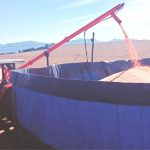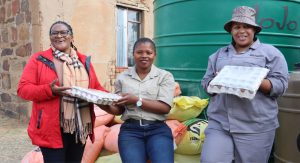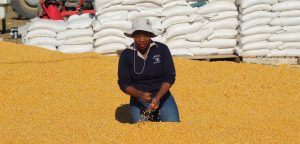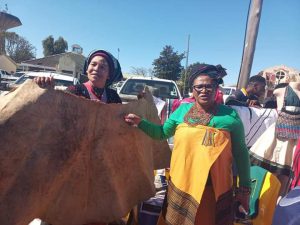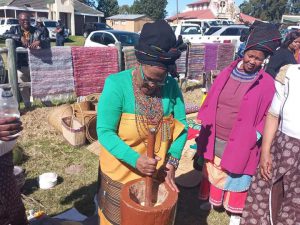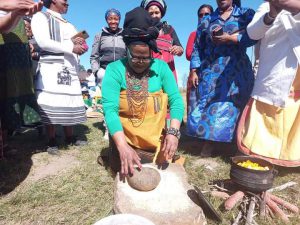
by Olwetu Batyi | Sep 12, 2022 | Uncategorized

Four silos to help farmer get better price for maize produce
By Thozi kaManyisana
One of leading women grain farmers in the Easstern Cape, Ms Zoliwe Nombewu is hoping to make huge profits from her maize harvest thanks to the four temporary silos the the Department of Rural Development and Agrarian Reform (DRDAR), which allow her to store maize to sell at the right time.
Award-winning Nombewu from Gotyibeni village praised DRDAR for supporting her with four 130 tons temporary silos with its auger feeder.
“The temporary silos will ensure I get huge profits because I’ll store my maize until the market price has risen. Before this support, I’d sell my maize while it is still cheap and I’d lose out but now I’ll keep and wait. My maize used toon the fields when I didn’t have silos if I kept it until prices were high. “The department’s intervention will make me grow and become a sustainable commercial farmer while I’m in the communal areas. I’m where I am as a business person because of the support from the department,” she said.
For a person who started farming with vegetable production on only two hectares of land in 2008, Nombewu is a force to be reckoned with as she now produce maize and dry beans on 300ha of land. She has also planted 5ha to motivate the community of Madwaleni village where she has leased the land she’s working.
On top of the silos, DRDAR has been supported her with production inputs to plant 64ha of maize through its flagship cropping programme. She was also assisted with a borehole for vegetable production as well as vegetable seedlings to continue producing on the 2ha of land she started with.
The farmer owns a fleet of 12 tractors, a combined harvester, 4 no-till planters, 12 ploughs, four discs, four 800 litre C sprayers, potato planter and its planter and a fine seed planter for vegetables. Her tractors were last year contracted by DRDAR through its partnership with Grain SA.
Nombewu was approached by subsistence farmers in the Madwaleni area to help them fence and plant their fallow land, which she did. She said when the land was tested it was discovered that it was not in good condition but she invested in lime and quality fertilizer.
“The results are now amazing,” she said. She sells her products to local agricultural products wholesalers in Mthatha, Qumbu and Tsolo as wells as local people.

by Olwetu Batyi | Sep 7, 2022 | Uncategorized

Govt. investment grows female farmer’s business
By Sanele James
EASTERN CAPE’s Rural Development and Agrarian Reform MEC, Nonkqubela Pieters describes Aliwal North’s young female farmer, Dintle Maphala a ‘fertile land’ that motivates the farmer to plough more. Pieters said this during her monitoring visit to Maphala’s farm in the Joe Gqabi District to see work at this mixed farming enterprise which jumped to greater heights expanding its operations following investments by various government departments and state-owned enterprises.
“Looking at what this business has become and it being managed by a young woman, the popular notion that says the government is spending taxpayers’ money carelessly needs to come to an end. It is development like what I see here that encourage the government and other investors to throw in more money. Land that produces good yields is always encouraging to the farmer. You are that land Dintle,” said Pieters.
In her 287ha size Goedehoop farm she got from her parents back in 2016, Maphala farms with brangus beef cattle, poultry, vegetables with mohair being her major commodities. DRDAR invested 30 Angora goats in the Maphala’s thriving business, 28 are ewes and two bucks through its Livestock Improvement Scheme, allowing her to phase out her mixed breed goats not yielding good wool clip quality.
The injection by DRDAR grew Maphala’s herd to 302 goats which she shears two times during the annual shearing season starting in each September. Maphala described government’s investment in her business as a springboard that shot her up to participate meaningfully in the production business.
“I am no longer doubtful of myself and the work I do. I produce both the quality and the quantity the market demands and this is through the investment made by DRDAR and Mohair SA in my business,” said Maphala. The DRDAR also fence her farm, completed her primary wool production needs with a shearing shed with all accessories starting from baling machine, sorter and a compressor.
In 2020 she was selected by the Office of the Premier to undergo poultry production training at the Tsolo Agriculture and Rural Development Institute (TARDI). This was followed by the purchasing of an egg incubator and construction of the 1080 birds capacity poultry structure for her farming business. She packs and sells more than 300 eggs per day. After seeing the progress in the business SEDA stepped in and invested in egg packaging material and developed a business plan while the NYDA offered business management training to complement Maphala’s farm management qualification.
Maphala sells veggies, eggs to local supermarkets in Aliwal North and plans to stretch her supply of day-old chicks to places as far as Komani. The Joe Gqabi District Municipality has committed to assist her with solar energy infrastructure to help her incubator hatch more eggs inline with her business expansion plans.
“I’m planning to be one of the ambassadors making sure that the youth sees agriculture as a career and a sector that has a potential to simultaneously create employment and feed the nation. All the investment that the government is making in me is because of the good work and strides I am making. But I will have to pay it back by employing and mentoring other young farmers, something which I am already doing,” she said. During her visit, Pieters delivered 200 bales of Lucerne and chicken feed to Maphala’s business.

by Olwetu Batyi | Sep 7, 2022 | Uncategorized

Extension officer wins farmer’s hearts, yields good harvest
WHEN ANDISWA RALA, the Extension Officer for the Eastern Cape Department of Rural Development and Agrarian Reform responsible for Mvenyane village in Ntabankulu, started this job she faced some obstacles including men who did not expect a young woman to give them advice about their fields and livestock.
This inspired her to continue working with her clients and later she won their hearts. Her responsibilities as the Extension Office include giving advice to livestock farmers, food producing farmers and households in her ward.
Rala said the work of the Extension Officer is to advise farmers about agriculture, to facilitate programmes of the department to make sure that they reach farmers, make sure that farmers benefit from these programmes.
She feels honoured for being in the field previously regarded as a man’s job because women also have what it takes to work in agriculture.
“People who regard this as a men’s job, feel that women don’t have much role to play in agriculture. I think there is a lot that we can do as women in this field, this field has no gender bias and we have the energy to drive agriculture to yield the good results you see here in these fields,” said Rala referring to the Amantonta fields in Mvenyane.
She said her role started with introducing the programmes of the Department to the farmers so that they are interested.
“We took soil samples from this land for analysis. We we provide yield estimation to the farmers so that they know what yield to expect to plan ahead with their marketing strategy,” she said.
Rala said some of her male clients were so reluctant to take advice from her about how to manage their animals, crops in the fields, correction and education from her.
“At first it was a big challenge telling a man how to plough their field or how to manage their livestock but as we work together, being visible to them, they now know that we also want good outcomes for their businesses.
They accept us and they know us. They even come to us to seek advice because they understand us men was a beautiful thing to a point that they now call them to share their frustrations when their animals are sick excitement when they give birth and when they yield good harvest.
“It makes us feel good that DRDAR has put us in a better place by giving us these jobs and opportunities to represent women in this field.
Seeing results of the work I was part of is the most beautiful experience. These fields are on dry land as you can see. There is a lot that needs to be done before we start production. It means ours advice, listening to the farmers and them listening to us on what needs to be done. Seeing these results is a wonderful dream to manifest,” said Rala.
She attributed Amantonta’s beautiful 6 tonnes per hectare harvest to hard work, saying this makes them as Extension Services of the DRDAR very excited. Rala said she hopes other farmers will follow this example by approaching DRDAR offices so that they can benefit from this programme

by Olwetu Batyi | Sep 5, 2022 | Uncategorized

Drdar’s women empowerment session was focusing on taking stock of the progress made in pursuit of the 8 HOD’s principles, which are:
- Transformation for non-sexism
- Establishing a policy environment
- Meeting equity targets
- Creating an enabling environment
- Gender mainstreaming
- Empowerment of women
- Providing adequate resources
- Accountability, monitoring and evaluation.

All this is done to ensure that women empowerment policies and programmes support women in the Department. Women play an important role in the planning and implementation of the programmes of the Department.

Female employees of the Department were participating in this important programme that was held in the Nelson Mandela Bay Metro.

by Olwetu Batyi | Aug 23, 2022 | Uncategorized

AMATHOLE DISTRICT WHERE FEMALE FARMERS SHOWCASED THEIR PRODUCE
Women were described as pillars of development who have the backbone to ensure that communities are developed.
This was said by the chairperson of Keiskammahoek-based Seven Stars Dairy Lumka Maso during the agriculture show where women from Amathole District Municipality and BCM showcased their produce.
“If a woman is around, no one goes to bed on an empty stomach. We are wise as women. We stand up for the well-being of our families and communities. We need more support for women programmes,” Maso said.
Nosandile Tyam from Dutywa said being involved in farming has changed her life for better.
“I now have graduates in my house from the money I make from farming. I have a hefty bank balance thanks to farming,” said Tyam whose business has been assisted by government with fencing of 150 ha of land where she is planting grain through the cropping programme of the DRDAR.

Eastern Cape Department of Rural Development and Agrarian Reform MEC Nonkqubela Pieters commended women for their great work.
“As I was going around the stalls, I was impressed by the good work you are doing. We need to shout out and speak about the development we do as women. Don’t look down at yourselves, you are doing a sterling job by feeding the nation,” she said.
South African National Defence Force representative Captain Mfundo Mampunye said his department has joined forces with the DRDAR and national department to fight hunger and poverty.
“We’ve an agreement with the national Department where we want to see your products being eaten by soldiers. We want food that is produced by you to be consumed at our bases instead of buying food in other places,” said Captain Mampunye.
Pieters said if the province was to feed the whole nation, women need to be strong in farming and ensure they occupy the space that is currently dominated by males.
She said the focus of the land reform programme will now be on women and youth because there were farms that were given to males but were now lying fallow.

Pieters said it was time for women to become rich through farming, urging them to encourage youth to join farming.
During the show, best farmer’s stalls from all municipalities within the Amathole District took home prize money with farmers from Mbashe Municipality walking away with the first prize of R10 000, Ngqushwa Municipality came second taking home R7000, Mnquma Municipality came third taking home R5 000. Consolation prizes of R2000 each went to BCM, Raymond Mhlaba, Great Kei and Amahlathi municipalities.

by Olwetu Batyi | Aug 12, 2022 | Uncategorized

MEC for DRDAR Nonkqubela Pieters with Agri-EC President Peter Cloete (right) and his deputy Eben du Plessis during the congress of the Agri-EC.
“I urge the farming community to be very sensitive when hiring people for jobs and prioritise local people in the communities where they operate,” Premier Lubabalo Oscar Mabuyane.

